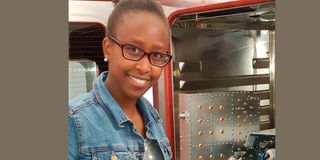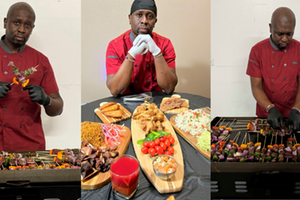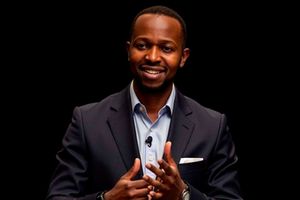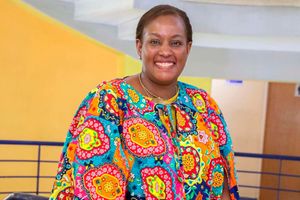
Tracy Jepkoech the 34 year-old Germany-based electronics engineer.
Tracy Jepkoech's career life can be broken down into three parts: dreams, realities, and concessions. Tracy has lived in Germany all her adult life, having left Kenya at 18, barely out of her parents’ protective nest.
As a child, her career dreams swung like a pendulum, but as she grew up, she concretised that by settling on medicine at first.
“I developed a lot of interest in human physiology, and that would have led me to medical school, except this changed much later when my mind shifted to studying in Germany,” says Tracy, who left Kenya immediately after her secondary school final exams.
Faced with two competitive careers, Tracy looked inwards to make a choice.
“With a civil engineer as a father, I had all the motivation to study engineering in college. I quickly but pragmatically aligned myself with a new passion. It helped that I seize opportunities and follow them through passionately. I believe a shift in the way you look at things can give different and sometimes even better results than you had planned,” she tells the Nation Lifestyle.
Read: From a dishwasher: How Cyprian Ajevi turned leftovers into a thriving cooking business in the US
While at Loreto High School, Matunda, Tracy, took German lessons, earning her enviable proficiency in the language. This gave her a head start when she relocated, as she never had to learn a new language from scratch. Her teacher introduced her to the Au Pair programme where she had to travel to Germany, live with a host family for up to one year and learn about culture and other aspects of life.
“The programme was a softer landing for my future life in Germany,” she says.
Sh1 million account
To travel to Germany, she needed either a guarantor or £8,000 (in a blocked account, about Sh1 million then and Sh1.4 million currently).
“This amount would then be released to the student every month in equal amounts for the whole year. You would then need the same amount to get a year's visa. Since I didn't have the money, I opted for a guarantor—my cousin—and had to finance myself outside her guarantorship. If I ever landed in financial trouble, my guarantor would be questioned and held accountable. It meant a lot of trust from her and a lot of caution and responsibility for me,” she says.
Before the one-year period came to an end in the Au Pair programme, she started applying for an undergraduate programme.
She used the “elimination method” to settle on the engineering discipline she would pursue at Leibniz University Hannover.
“In hindsight, medicine would have troubled me because of the complex medical terms in the German language. Engineering, on the other hand, is more technical and less about language. While I was best motivated to consider civil engineering, my childlike curiosity led me to consider electrical engineering in the broader spectrum and specifically telecommunications engineering. My inspiration was simple: how does a radio transmit signals from A to B? From the onset, the idea to specialise was very clear,” she says.
Tracy started working as soon as she got admitted to the university. As a self-sponsored student, she needed to work to support her studies and upkeep since she was not one to expect help from home.
“I have done so many odd jobs, I can’t keep count. I have worked in supermarkets as a shelf attendant, served in restaurants, and in pubs. It is not that I was constantly changing jobs. My Au Pair agent had all these jobs that I transitioned to from time to time,” she says.
Work, improved her saving culture, prepared her for the job market in future, introduced her to the work culture of the country, and familiarised her with consequential obligations like taxation, insurance, benefits and much more than one deals with in the work ecosystem.
Cost of living
In her 17 years in Germany, she ranks housing as the most expensive, especially during her schooling days.
"As a student, I would pay around ten times more compared to my counterparts living in Kenya. For food, the prices for most basic commodities like wheat flour, milk, and sugar do not differ as much. So, unless you are going for the expensive things, it is manageable,” she says.
When she was done with her undergraduate studies, she did not feel ready enough to start working.
“I proceeded to do my Master's in telecommunications engineering. During this time, I was lucky to have a trainee job at an engineering company that affirmed me and the career path I was on,” she says.
She had a six-month break from when she graduated in 2019.
“It wasn’t an intentional break, but one that I needed. I visited family and friends in Kenya, had time to gather my thoughts in terms of where I wanted to look for jobs, write a proper CV, and principally get a moment to catch a break from the long and continuous periods of work and studies I was coming from,” she says.
Pay and career growth
Working in Germany has had her disabuse the idea of what career growth looks like.
“I have come to see that career growth is not a tunnel and that growth must not be defined as climbing up a ladder in leadership and management roles. In this country, one can remain where they are and experience lateral growth by gaining more experience and building expertise. You become an expert in your area and get compensated just as someone whose growth experience is vertical,” she says.
She has also witnessed how working systems can get the work done more easily.
Since a smooth sail never made a skilled sailor, Tracy has had to overcome challenges to get on top of things.
“Getting into the culture and system was my first challenge: punctuality, communication, and how to look for and find information. For example, to apply for a degree, I did not have to talk to someone in an office but check online and call in case of queries—this is about 15 years ago. I managed culture differences seamlessly since I was young and embraced much easily. I like the direct communication that makes me feel safe, that nothing is hidden once confronted.
Right now, that I am settling and having a family, the challenges I am facing are: how to get a good blend of both cultures and expose them so that they are strong in both areas (my husband, also a Kenyan, has joined me, and we now have a son). Dating or maintaining a relationship with someone back home is also a big challenge. My husband and I resolved to sail above this by keeping our communication open before we got married,” she says.
A key lesson she is keen to share with young people is, “separate fantasy from the real world. Dream and leave a little room for adjustment. Toughen up, as sometimes these dreams will not turn out as you hope. Toughening up is your saving grace; you get the agency to easily shift from the imagined to the available reality.”









